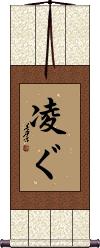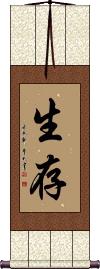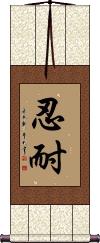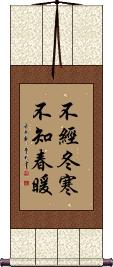Many custom options...
And formats...

Endure and Survive in Chinese / Japanese...
Buy an Endure and Survive calligraphy wall scroll here!
Personalize your custom “Endure and Survive” project by clicking the button next to your favorite “Endure and Survive” title below...
Endure and Survive
Survive
生存 means “to survive.” In some contexts, it can mean survival, to live, to exist, or existence.
生存 is not a common selection for a wall scroll, but a lot of people search for this term, so I added it to the database.
Patience / Perseverance / To Endure / Tolerant
忍耐 is patience, the quiet hope, and trust that things will turn out right.
You wait without complaining. You are tolerant and accepting of difficulties and mistakes. You picture the end in the beginning and persevere to meet your goals.
忍耐 can also mean “to endure,” “restrain oneself,” or “forbearance,” and in some contexts, it can mean “perseverance” or “endurance.”
忍耐 is also used as a tenet of Taekwondo, Tang Soo Do, and other Korean martial arts where it's titled “Endurance” and romanized as “In Neh.”
![]() Note that when writing this as Kanji, Japanese will tend to write the first character in the form shown to the right. If you select our Japanese master calligrapher, please expect this Kanji form (yes,
it’s
just one stroke that is slightly different in location, crossing another stroke in the Japanese Kanji form).
Note that when writing this as Kanji, Japanese will tend to write the first character in the form shown to the right. If you select our Japanese master calligrapher, please expect this Kanji form (yes,
it’s
just one stroke that is slightly different in location, crossing another stroke in the Japanese Kanji form).
See Also: Peace | Harmony | Perseverance
You must endure a harsh winter to appreciate the warmth of springtime
You must know hardship to appreciate happiness
This literally translates as: Without having experienced the cold of winter, one cannot appreciate the warmth of spring.
Figuratively, this means: One cannot truly appreciate happiness without having gone through hardship.
There are many contrasts in life. One simply cannot fully know what joy is without having experienced misery, difficulty, and pain. How could you explain “light” if you did not have “darkness” to compare it to?
Embrace hardship, as it makes the good times seem even better.
Not the results for endure and survive that you were looking for?
Below are some entries from our dictionary that may match your endure and survive search...
| Characters If shown, 2nd row is Simp. Chinese |
Pronunciation Romanization |
Simple Dictionary Definition |
任 see styles |
rèn ren4 jen makoto まこと |
to assign; to appoint; to take up a post; office; responsibility; to let; to allow; to give free rein to; no matter (how, what etc); classifier for terms served in office, or for spouses, girlfriends etc (as in 前任男友) obligation; duty; charge; responsibility; (given name) Makoto Bear, endure, let; office; it is used to connote laisser-faire; one of the 四病, as 任運 implies laisser-aller; it is intp. by let things follow their own course, or by 自然 naturally, without intervention. |
堪 see styles |
kān kan1 k`an kan tan たん |
More info & calligraphy: Kane(personal name) Tan To bear, sustain, be adequate to. |
忍 see styles |
rěn ren3 jen nin にん |
More info & calligraphy: Patience / Perseverance(archaism) endurance; forbearance; patience; self-restraint; (given name) Nin kṣānti, 羼提 (or 羼底); patience, endurance, (a) in adverse circumstances, (b) in the religious state. There are groups of two, three, four, five, six, ten, and fourteen, indicating various forms of patience, equanimity, repression, forbearance, endurance, constancy, or "perseverance of the saints," both in mundane and spiritual things. |
克服 see styles |
kè fú ke4 fu2 k`o fu ko fu kokufuku こくふく |
More info & calligraphy: Overcome(noun, transitive verb) conquest (of a difficulty, illness, crisis, etc.); overcoming; surmounting; bringing under control |
凌ぐ see styles |
shinogu しのぐ |
More info & calligraphy: Endure and Survive |
忍耐 see styles |
rěn nài ren3 nai4 jen nai nintai にんたい |
More info & calligraphy: Patience / Perseverance / To Endure / Tolerant(noun, transitive verb) endurance; perseverance; patience forbearance |
生存 see styles |
shēng cún sheng1 cun2 sheng ts`un sheng tsun seizon / sezon せいぞん |
More info & calligraphy: Survive(n,vs,vi) existence; being; life; survival |
絕處逢生 绝处逢生 see styles |
jué chù féng shēng jue2 chu4 feng2 sheng1 chüeh ch`u feng sheng chüeh chu feng sheng |
More info & calligraphy: Return From Death’s Door |
存 see styles |
cún cun2 ts`un tsun yasushi やすし |
to exist; to deposit; to store; to keep; to survive (given name) Yasushi To keep, maintain, preserve. |
怕 see styles |
pà pa4 p`a pa ha |
to be afraid; to fear; to dread; to be unable to endure; perhaps to dread |
挨 see styles |
ái ai2 ai |
to suffer; to endure; to pull through (hard times); to delay; to stall; to play for time; to dawdle |
擱 搁 see styles |
gé ge2 ko |
to bear; to stand; to endure; Taiwan pr. [ge1] |
殘 残 see styles |
cán can2 ts`an tsan zan |
to destroy; to spoil; to ruin; to injure; cruel; oppressive; savage; brutal; incomplete; disabled; to remain; to survive; remnant; surplus To spoil, injure; cruel. |
熬 see styles |
áo ao2 ao |
to cook on a slow fire; to extract by heating; to decoct; to endure |
經 经 see styles |
jīng jing1 ching tsune つね |
classics; sacred book; scripture; to pass through; to undergo; to bear; to endure; warp (textile); longitude; menstruation; channel (TCM); abbr. for economics 經濟|经济[jing1 ji4] (female given name) Tsune A warp, that which runs lengthwise; to pass through or by, past; to manage, regulate; laws, canons, classics. Skt. sūtras; threads, threaded together, classical works. Also called 契經 and 經本. The sūtras in the Tripiṭaka are the sermons attributed to the Buddha; the other two divisions are 律 the Vinaya, and 論 the śāstras, or Abhidharma; cf. 三藏. Every sūtra begins with the words 如是我聞 'Thus did I hear', indicating that it contains the words of Śākyamuni. |
耐 see styles |
nài nai4 nai tsuyoshi つよし |
(bound form) to bear; to endure; to withstand (prefix) (See 耐アルカリ性) -proof; -resistant; (male given name) Tsuyoshi To endure, bear. |
茹 see styles |
rú ru2 ju |
to eat; (extended meaning) to endure; putrid smell; vegetables; roots (inextricably attached to the plant) |
不堪 see styles |
bù kān bu4 kan1 pu k`an pu kan fukan ふかん |
cannot bear; cannot stand; utterly; extremely (noun or adjectival noun) (rare) incompetence unable to endure |
不支 see styles |
bù zhī bu4 zhi1 pu chih |
to be unable to endure |
保つ see styles |
tamotsu(p); motsu(ik) たもつ(P); もつ(ik) |
(transitive verb) (1) to keep; to preserve; to hold; to retain; to maintain; to sustain; (v5t,vi) (2) to last; to endure; to keep well (food term); to wear well; to be durable |
保苗 see styles |
bǎo miáo bao3 miao2 pao miao |
to protect young plants, ensuring that enough survive to produce a good crop |
倖存 幸存 see styles |
xìng cún xing4 cun2 hsing ts`un hsing tsun |
to survive (a disaster) |
受罪 see styles |
shòu zuì shou4 zui4 shou tsui |
to endure; to suffer; hardships; torments; a hard time; a nuisance |
可堪 see styles |
kě kān ke3 kan1 k`o k`an ko kan |
how can one endure?; to be able to endure |
含忍 see styles |
hán rěn han2 ren3 han jen |
to bear; to endure; to tolerate |
啖う see styles |
kuu / ku くう |
(out-dated kanji) (transitive verb) (1) (masculine speech) to eat; (2) to live; to make a living; to survive; (3) to bite; to sting (as insects do); (4) to tease; to torment; to taunt; to make light of; to make fun of; (5) to encroach on; to eat into; to consume; (6) to defeat a superior; to threaten a position; (7) to consume time and-or resources; (8) (colloquialism) to receive something (usu. an unfavourable event); (9) (masculine speech) (vulgar) to have sexual relations with a woman, esp. for the first time |
喰う see styles |
kuu / ku くう |
(transitive verb) (1) (masculine speech) to eat; (2) to live; to make a living; to survive; (3) to bite; to sting (as insects do); (4) to tease; to torment; to taunt; to make light of; to make fun of; (5) to encroach on; to eat into; to consume; (6) to defeat a superior; to threaten a position; (7) to consume time and-or resources; (8) (colloquialism) to receive something (usu. an unfavourable event); (9) (masculine speech) (vulgar) to have sexual relations with a woman, esp. for the first time |
固窮 固穷 see styles |
gù qióng gu4 qiong2 ku ch`iung ku chiung |
to endure poverty stoically |
圖存 图存 see styles |
tú cún tu2 cun2 t`u ts`un tu tsun |
to try to survive |
堪る see styles |
tamaru たまる |
(v5r,vi) (kana only) to bear (often adds emphasis); to endure |
Click here for more endure and survive results from our dictionary
The following table may be helpful for those studying Chinese or Japanese...
| Title | Characters | Romaji (Romanized Japanese) | Various forms of Romanized Chinese | |
| Endure and Survive | 凌ぐ | shinogu | ||
| Survive | 生存 | seizon | shēng cún sheng1 cun2 sheng cun shengcun | sheng ts`un shengtsun sheng tsun |
| Patience Perseverance To Endure Tolerant | 忍耐 | nin tai / nintai | rěn nài / ren3 nai4 / ren nai / rennai | jen nai / jennai |
| You must endure a harsh winter to appreciate the warmth of springtime | 不經冬寒不知春暖 不经冬寒不知春暖 | bù jīng dōng hán bù zhī chūn nuǎn bu4 jing1 dong1 han2 bu4 zhi1 chun1 nuan3 bu jing dong han bu zhi chun nuan | pu ching tung han pu chih ch`un nuan pu ching tung han pu chih chun nuan |
|
| In some entries above you will see that characters have different versions above and below a line. In these cases, the characters above the line are Traditional Chinese, while the ones below are Simplified Chinese. | ||||
Successful Chinese Character and Japanese Kanji calligraphy searches within the last few hours...







